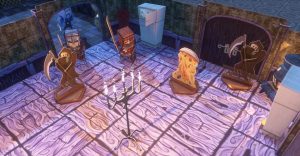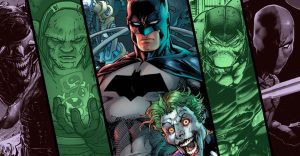The ONLY Red Dead Redemption Gang Member John Actually Has To Kill

Both Red Dead Redemption and its sequel Red Dead Redemption 2 at least partially follow the story of John Marston and how he hunts down and kills/captures several members of his former gang. However, the reason behind his manhunts is different in each game, and ultimately the Red Dead Redemption franchise only requires the player (and therefore Marston) to kill one out of the four outlaws.
[Warning: Spoilers for Red Dead Redemption & RDR2 below.]
The original Red Dead Redemption focused entirely on John Marston as he is manipulated by the FBI into abandoning his life as a farmer to hunt down three surviving members of his former gang run by Dutch Van Der Linde. These men are Bill Williamson, Javier Escuela, and Van Der Linde himself. John’s attitude towards each outlaw differs greatly between the three, but it is established that despite his animosity towards some, he does not wish to kill any of them. He is instead forced to by the United States Government. John goes on a similar manhunt in Red Dead Redemption 2, which takes place both just before and after Marston’s old gang breaks up. In this game, Marston hunts down Micah Bell, who secretly betrayed the gang by acting as an informant for a private investigation bureau which had been trailing them. Micah’s deceit splits gang loyalties, and inevitably causes them to fracture and disperse, making Marston’s vendetta against him an extremely personal matter, deeply contrasting his motivations in the first Red Dead Redemption game.
When players first meet John Marston in the first Red Dead Redemption, he is fresh off the train from his farmstead, which has been rendered nearly vacant as the FBI abducted his family in an attempt to strongarm him into hunting down his former outlaw brethren. Marston agrees for the sake of his family, and when he arrives at Bill Williamson’s stronghold just after disembarking he makes it clear that he has no personal desire to harm Bill. He politely “implores” Bill to come peacefully, only threatening the use of force as a last resort. Marston’s civility is met with a gunshot, but it still explains why, once players do finally get the upper hand on Bill, they have the choice of whether or not to execute him personally. Williamson dies either way, but players get to decide whether or not to pull the trigger.
How John Marston’s Attitude Towards His Gang Changes

The same can be said for Javier Escuela, for whom players are transparently presented the option of whether or not to spare. The only gang member players are given no option for in the first game is Dutch himself. Near the game’s conclusion, when Marston finally corners Dutch on a precarious cliffside in a snow mountain range, the game unravels the interaction entirely through cutscenes. Marston makes no moves to kill Dutch. Instead, Dutch gives one final monologue (which is echoed by a similar speech in RDR2) about the futility of both their endeavors before throwing himself off the cliff. Throughout this interaction Marston remains composed, and simply walks away when all is said and done.
In stark contrast to all three of these scenarios, Marston’s manhunt in Red Dead Redemption 2 is more than just out of necessity. In fact, Marston risks the potential life he has with his family in order to chase down Micah for his transgressions. There’s nothing but animosity towards Micah on Marston’s part. Even when the manhunt goes awry and devolves into a Mexican Standoff between Dutch, Micah, and Marston, Marston stays resolute in his desire to kill Micah. Then, when Dutch betrays Micah as revenge for breaking the gang up, John capitalizes on the situation to put an end to him. Instead of a cutscene or being offered a choice, the player is put into Dead Eye mode and encouraged to fill Micah up with as much lead as possible.
This ending is much more reminiscent of the original Red Dead Redemption’s optional side-quest ending, where Jack Marston avenges his father in a classic quickdraw duel. In both these scenarios, the protagonist is intent on taking their opponent’s life. Their conflict is entirely personal. The contrast of this scenario with Marston’s treatment of his former Van Der Linde gang comrades in the first installment illustrates a great deal of character growth. Despite the fact that Bill, Javier, and Dutch all betrayed Marston and left him for dead during a heist, he bears no personal resentment to them. Between the first and second Red Dead Redemption titles Marston undergoes a major shift in perspective, and by the events of the first game he is more inclined to put his personal resentment aside for what he considers the greater good. For the older, wiser John Marston, revenge is just business.
About The Author

















